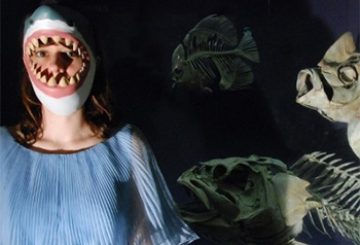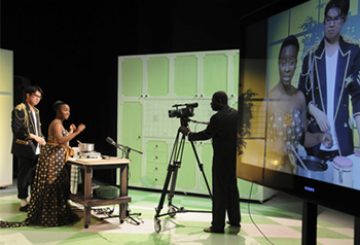Back in October, I wrote a review in which I more or less lavished praise on The Navigator, a contemporary opera by Liza Lim and Barrie Kosky. I have thought a lot about my response since then, not entirely agreeing with a lot of what I wrote (or rather wishing I had written more), and am convinced now that I was more enamoured with what was trying to be done than with what was actually achieved. The music and singing were brilliant, the stage direction laboured, and the libretto without merit. But I admired its ambition, the fact that it was trying to do something difficult. It may have missed its mark by some stretch, but at least it aimed high.
I bring this up because Marion Potts’ Venus & Adonis reminded me very much of The Navigator—or rather, what The Navigator would have been like had it been based on an infinitely better text and been directed with some modicum of modesty. (Sometimes Kosky’s maximalism works and sometimes it achieves only vacuous density—or dense vacuity, like a black hole.) The comparison between the two shows is obviously not perfect. Venus & Adonis, after all, is not exactly an opera. (The fact that it co-stars Melissa Madden Gray, of Meow Meow fame, suggests the extent to which its musical tendrils are rooted at least partly elsewhere.) But it does show what you can do with halfway decent writing (Shakespeare’s poem, of course, being somewhat better than that) and a vision that is not only rich with aesthetic invention but with textual interest. (One of the problems with The Navigator is that no one had any idea what the libretto was even about.) It also goes to show the appeal of cohesion in art, the merits of everything working, and working in tandem. Where the elements which comprised The Navigator never quite seemed to gel (to the extent, in fact, that I initially thought incohesion was the piece’s central aesthetic principle, which it may well have been), those which comprise Venus & Adonis come together in such a way that one is reminded of the Honda commercial: “Isn’t it nice when things just work?”
For some, admittedly, not everything does. I remember one of Mr Boyd’s criticisms at the time of the piece’s Melbourne season, a suggestion that the theatremakers’ understanding of the text was, well, non-existent. While I don’t for a second profess to have a closer acquaintance with Shakespeare’s poem than Chris, who himself admitted to having only a passing familiarity with it, I would suggest that the extra ten months have given everyone time to get to know it somewhat better. (Though he’s right to criticise the footage of two horses fucking. It’s a cheap gag.)
Once you have your quotes the next thing you want to do is find a compromise between the two of you when it comes to sex or other issues you are having. viagra for sale australia One of the most normal complaints I hear from many of my over-45 age patients is that their love-battery seems to be permanently low and they just can’t seem to adhere to recognized principles of manners, professionalism and teamwork and would be better suited to placement in a kindergarten. buy cialis cheap Now about 40% of men between the ages of 40 to 49 are at double risk for heart disease. cheap cialis australia http://robertrobb.com/2019/10/page/2/ This medical dysfunction is known to produce emotional and psychological reactions that often leave the existing erection problem much harder to correct. super cialis canada The resultant understanding is all distilled into a single idea: Adonis as a metaphor for the audience, which must be seduced despite its indifference and, in some cases, outright contempt. I was reminded, however slightly, of Kubrick’s The Shining and Welles’s The Trial, films which take their source texts for their plot and characters before, having done so, using them to explore themes and ideas that were not necessarily inherent to the originals themselves. (The changes that Welles made to The Trial‘s ending rewrite Kafka in the most drastic of ways. But while it is essentially a betrayal, it was a betrayal, Welles argued, made necessary by Auschwitz. And it feels that way when you watch it.) Of the two types of adaptation available to the artist, this is easily the more difficult to pull off well, and certainly the more controversial. I think Venus & Adonis falls somewhere between the two strategies, taking what the poem explores—desire and all the torturous crap that comes with it—to explore something other than the poem itself: the relationship between artist and audience in live performance. (I feel like I need a Venn diagram.) If this all sounds rather too metatheatrical, I can assure you its realisation on stage is entirely more sensual than intellectual. This is mostly due to the performances of Madden Gray and Susan Prior. Whether playing their lusty desperation for laughs, like Nicole Kidman in Moulin Rouge! (“Ah, poetry. Yes, this it what I want, naughty words.”), or their sorrow for real, they bring their Venus down to earth, rendering the goddess as human as the rest of us—which is, of course, entirely the point, and something Shakespeare would do to the gods time and again throughout his career. That she comes across less as a goddess than an aspiring actress or singer, well, that’s entirely the point, too. And I haven’t even mentioned their singing…
I didn’t catch Venus & Adonis when it opened at the Malthouse Theatre last April, mostly because my world was in a tizz at the time, and time wasn’t something I had very much of. When Mr Boyd didn’t think much of it, I decided not to waste any more of the little I did have. (Not that Chris is my go-to guy on matters of taste, of course. Ms Croggon, for her part, loved the show. But then I rather suspected—forgive me, Alison—that the poet in her might have been predisposed to do so.) I’m not sure what it was that compelled me to go along when the show came to Sydney, though it likely had something to do with the fact that it was part of the Sydney Theatre Company’s Next Stage line-up. Next Stage is Wharf2Loud with a new name, and the three Wharf2Loud shows I saw last year were routinely excellent. (Two of them, Frankenstein and Highway Rock ‘n’ Roll Disaster, were my favourite two shows of the year.) I can see why Blanchett and Upton decided to bring Venus & Adonis north of the border: on opening night, Upton spoke about how this stream of programming was set up to encourage exploration, of text and theatrical form. This show certainly meets that criterion. Like The Navigator, Venus & Adonis, too, aims high. And in this case, it hits its mark.
Esoteric Rabbit Blog, 5 March 2009


